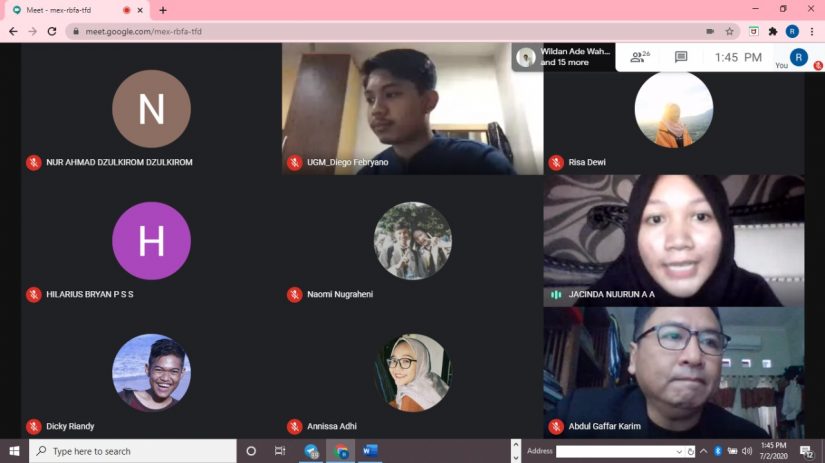
Yogyakarta, July 2nd 2020 – The Politics and Government Students Corps (Korps Mahasiswa Politik dan Pemerintahan/KOMAP) FISIPOL UGM held an online discussion called, ‘The Silencing of Academic Discussion, the New Concept of Academic’s New Normal?’. This event was moderated by Jacinda Nurun and presented two speakers, they were Abdul Gaffar Karim, the lecturer of Department of Politics and Government FISIPOL UGM and Diego Febryano, the Coordinating Minister of Analysis of BEM KM UGM 2020. In this occasion, the discussion was aired through Google Meet and lasted from 01.00 p.m. to 03.30 p.m. This event was divided into two sessions, the first session was the explanation session from the speakers and the second session was the question and answer session with the speakers.
As the opening of the discussion, both of the speakers answered the questions from the moderator. In this session, both of the speakers explained some important points such as the basic concept of academic freedom, the urgency of silencing the academic, and the comparison of academic freedom in the New Order era with the current era. The first speaker, Abdul Gaffar Karim, explained that in the academic freedom perspective, an individual was not separated from their historical obligations as the civitas academica. Meanwhile, according to the second speaker, the academic freedom itself was the obligation of the civitas academica itself. However, regarding the protection and accountability of academic freedom activities, it was the responsibility of the leader of a university.
The rise of cases of the silencing the academic discussion, such as the CLCS UGM, indicated that there were problems in the concept of academic freedom. According to the speakers, the urgency of those silencing the academic discussion had something to do with the public opinion, the main goal was to unite the public opinion. According to Gaffar, the dissenting opinions could be something positive if it well managed. This indicated that there were a healthy competition where there were several groups competing with each other and tried to make their opinions to be heard by the public. What dangerous was, when there were efforts to silence the groups which had different opinions, such as CLS UGM. Other than that, Diego also said that the students alliance itself had supported and managed the issues related to the CLS UGM case. Several efforts had been made such as accompanied the CLS UGM to report the case to the academic senate and discussed with the Commission 1 of the Board of Trustees to formulate a regulation regarding the academic freedom issue.
As the comparison of the academic freedom of New Order era and Reformation era, the speakers explained their answer briefly and interestingly. As an academics who had been through the New Order era, Gaffar said that the ideological matters and the Soeharto’s family issues became the sensitive issues in that era. According to him, the obvious difference between New Order and Reformation era could be seen through the party who became the enemy. In the New Order era, the enemy was clear, the intels and the rulers. Meanwhile in this era, the civil societies became suspicious with one another, attacking one another, so that it was not clear about who do we fight. This condition indicated that there were several important things which could be the roots of the problems: risks and trust. In the New Order era with its high risk, we had a high trust with one another. But in this era, with a lower risk, our trust became lower too.
In the question and answer session, the audience enthusiasm was high. There were several questions asked by the audience, one of them was from Hillarius Brian, regarding the standard of academic freedom. The speakers answered that question by explaining that the academic freedom was divided into two forms: general and specific. In this case, academic freedom obviously related with academic things. An academics must be responsible in delivering their knowledge. In this case, an academic lying such as lying based on the data was one of the things that should be avoided by the academics. Other than that, even though we have the rights to deliver our knowledge, it was important to be underlined that our knowledge could still be falsifiable with the next production of knowledge.
